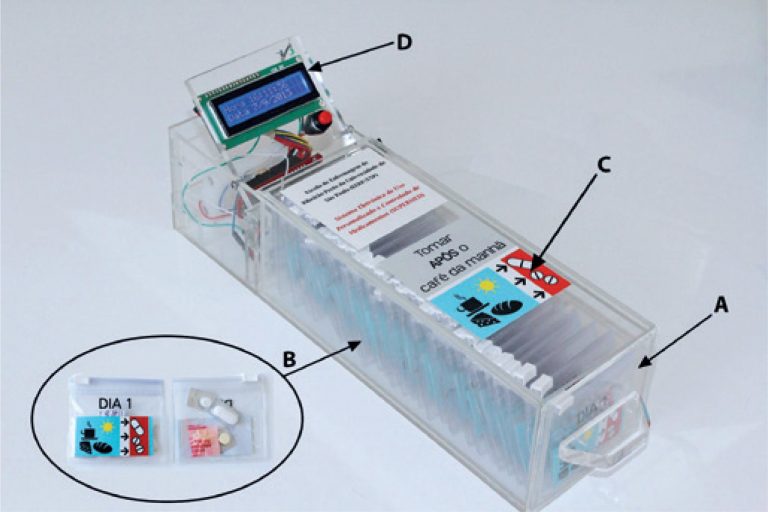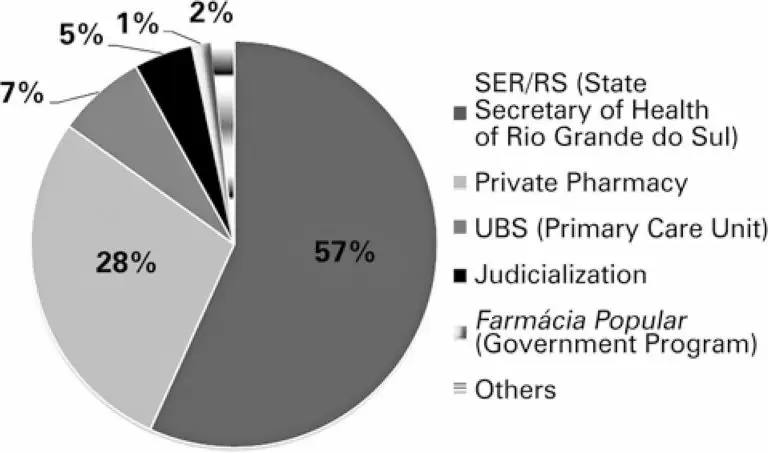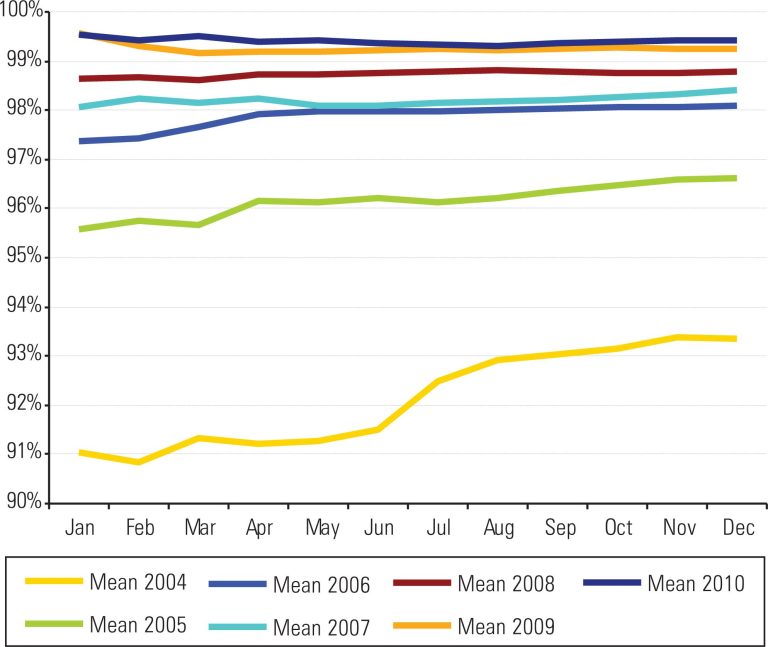13/Sep/2021
The use of an electronic medication organizer device with alarm to improve medication adherence of older adults with hypertension
einstein (São Paulo). 13/Sep/2021;19:eAO6011.
View Article13/Sep/2021
The use of an electronic medication organizer device with alarm to improve medication adherence of older adults with hypertension
DOI: 10.31744/einstein_journal/2021AO6011
ABSTRACT Objective: To examine whether the use of a monthly electronic medication organizer device equipped with an alarm clock, called Electronic System for Personal and Controlled Use of Medications (Supermed), improves medication adherence of older adults with hypertension. Methods: This is a quali-quantitative, prospective, before-and-after study performed with 32 older adult patients with diagnosis of hypertension, who were recruited at a Primary Care Unit in Brazil. Results: The main outcome measures were improvement of medication adherence and blood pressure control […]
Keywords: Aged; Drug utilization; Equipment and supplies; Patient safety; Reminder systems
05/Mar/2021
Medication regimen complexity of coronary artery disease patients
DOI: 10.31744/einstein_journal/2021AO5565
ABSTRACT Objective: To determine the factors associated with the high complexity of medication regimen in patients with coronary artery disease. Methods: A cross-sectional study was carried out in a multiprofessional cardiology outpatient clinic, in the Secondary Care of the Unified Health System, where sociodemographic (age, sex, and education), clinical (number of health conditions, cardiovascular diagnoses, and comorbidities) and pharmacotherapeutic (adherence, polypharmacy, and cardiovascular polypharmacy) characteristics were collected. These were related to complexity of medication regimen, measured through the medication regimen […]
Keywords: Cardiovascular diseases; Coronary artery disease; Drug utilization; Medication Adherence; Polypharmacy
06/Aug/2020
Use of drugs for gastrointestinal disorders: evidence from National Survey on Access, Use and Promotion of Rational Use of Medicines
einstein (São Paulo). 06/Aug/2020;18:eAO5314.
View Article06/Aug/2020
Use of drugs for gastrointestinal disorders: evidence from National Survey on Access, Use and Promotion of Rational Use of Medicines
DOI: 10.31744/einstein_journal/2020AO5314
ABSTRACT Objective To estimate the prevalence of use of drugs to treat gastrointestinal disorders, according to demographic, socioeconomic, and health characteristics of the Brazilian population. Methods This is a population-based survey that interviewed individuals residing in cities of the five regions in Brazil. The study sample was composed of 32,348 individuals aged 20 or more years. The profile of use of drugs for gastrointestinal disorders was evaluated considering the variables sex, age, healthcare plan, region, and number of chronic diseases. […]
Keywords: Aged; Drug utilization; Gastrointestinal tract; Health policy; Health Surveys; Patient Medication Knowledge; Pharmaceutical services; Pharmacoepidemiology; Polypharmacy; Proton pump inhibitors
20/Dec/2019
Pharmaceutical intervention in the rational use of intravenous omeprazole
DOI: 10.31744/einstein_journal/2020AO4433
ABSTRACT Objective: To describe the pharmaceutical interventions of a vertical clinical pharmacy service to promote the rational use of intravenous omeprazole. Methods: A prospective and descriptive study carried out at a university hospital in the Midwestern Region of Brazil, from November 2014 to May 2015. The service consisted of the analysis of adequacy of the route of administration of omeprazole in relation to the clinical conditions of the patient, as well as the use of the appropriate diluent. Interventions were […]
Keywords: Drug utilization; Infusions, intravenous; Omeprazole; Patient safety; Pharmaceutical services
30/Oct/2018
Medications used in pediatric cystic fibrosis population
DOI: 10.31744/einstein_journal/2018AO4212
ABSTRACT Objective To describe the drug utilization profile used by pediatric cystic fibrosis patients. Methods A transversal study comprising the analysis of records and interviews with caregivers of pediatric patient in a reference center of Southern Brazil. We collected information about patients’ clinical condition, medication used and household therapy. Results Out of 78 patients participating in the study, prevailing characteristics were: female, self-declared white color, mutation F508del and countryside resident. Forty-three patients had health monitoring exclusively in the hospital’s outpatient […]
Keywords: Caregivers; Child; Cystic fibrosis; Drug utilization; Pharmaceutical preparations; Pharmaceutical services
30/Jun/2015
Strategies for appropriate antibiotic use in intensive care unit
DOI: 10.1590/S1679-45082015RW3145
The comsumption of antibiotics is high, mainly in intensive care units. Unfortunately, most are inappropriately used leading to increased multi-resistant bacteria. It is well known that initial empirical therapy with broad-spectrum antibiotics reduce mortality rates. However the prolonged and irrational use of antimicrobials may also increase the risk of toxicity, drug interactions and diarrhea due to Clostridium difficile. Some strategies to rational use of antimicrobial agents include avoiding colonization treatment, de-escalation, monitoring serum levels of the agents, appropriate duration of […]
Keywords: Antibacterial agents; Drug utilization; Intensive care units
01/Oct/2011
Implementation and progress of clinical pharmacy in the rational medication use in a large tertiary hospital
DOI: 10.1590/S1679-45082011AO2140
ABSTRACT Objective: To show developments and contributions of a clinical pharmacy service in safety and rational use of medications in a large tertiary hospital. Methods: Clinical pharmacists were responsible for all issues using medications at the hospital. In the beginning this professional was responsible for analyzing medical prescriptions, horizontal visits, and to set up protocols. Afterwards, other activities were designated such as monitoring for drug safety, participating in committees and managed routines. If problems were found, the pharmacist reported them […]
Keywords: Drug utilization; Pharmacy service, hospital; Safety




